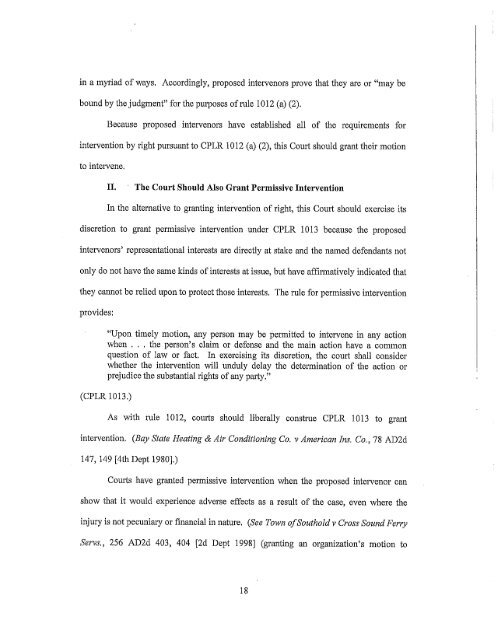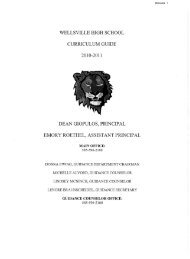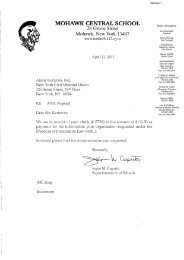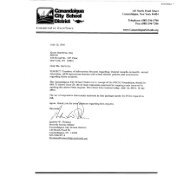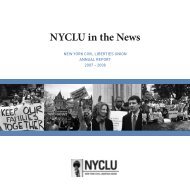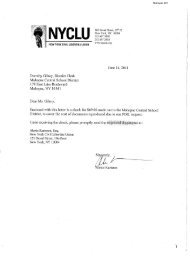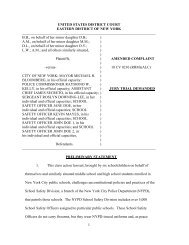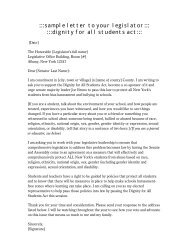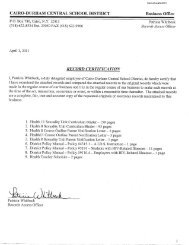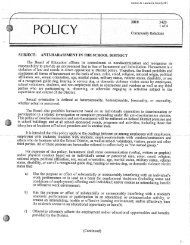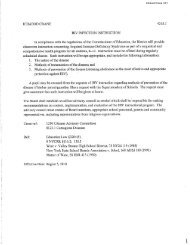Memo in Support of Motion to Intervene (PDF) - New York Civil ...
Memo in Support of Motion to Intervene (PDF) - New York Civil ...
Memo in Support of Motion to Intervene (PDF) - New York Civil ...
You also want an ePaper? Increase the reach of your titles
YUMPU automatically turns print PDFs into web optimized ePapers that Google loves.
<strong>in</strong> a myriad <strong>of</strong> ways. Accord<strong>in</strong>gly, proposed <strong>in</strong>tervenors prove that they are or "may be<br />
bound by the judgment" for the purposes <strong>of</strong> rule 1012 (a) (2).<br />
Because proposed <strong>in</strong>tervenors have established all <strong>of</strong> the requirements for<br />
<strong>in</strong>tervention by right pursuant <strong>to</strong> CPLR 1012 Ca)(2), this Court should grant their motion<br />
<strong>to</strong> <strong>in</strong>tervene.<br />
II.<br />
The Court Should Also Grant Permissive Intervention<br />
In the alternative <strong>to</strong> grant<strong>in</strong>g <strong>in</strong>tervention <strong>of</strong> right, this Court should exercise its<br />
discretion <strong>to</strong> grant permissive <strong>in</strong>tervention under CPLR 10l3 because the proposed<br />
<strong>in</strong>tervenors' representational <strong>in</strong>terests are directly at stake and the named defendants not<br />
only do not have the same k<strong>in</strong>ds <strong>of</strong> <strong>in</strong>terests at issue, but have affirmatively <strong>in</strong>dicated that<br />
they cannot be relied upon <strong>to</strong> protect those <strong>in</strong>terests. The rule for permissive <strong>in</strong>tervention<br />
provides:<br />
"Upon timely motion, any person may be permitted <strong>to</strong> <strong>in</strong>tervene <strong>in</strong> any action<br />
when ... the person's claim or defense and the ma<strong>in</strong> action have a common<br />
question <strong>of</strong> law 01' fact. In exercis<strong>in</strong>g its discretion, the court shall consider<br />
whether the <strong>in</strong>tervention will unduly delay the determ<strong>in</strong>ation <strong>of</strong> the action 01'<br />
prejudice the substantial rights <strong>of</strong> any party."<br />
CCPLR10l3.)<br />
As with rule 1012, courts should liberally construe CPLR 10l3 <strong>to</strong> grant<br />
<strong>in</strong>tervention. (Bay State Heat<strong>in</strong>g & Air Condition<strong>in</strong>g Co. v American Ins, Co" 78 AD2d<br />
147, 149 [4th Dept 1980].)<br />
Courts have granted permissive <strong>in</strong>tervention when the proposed <strong>in</strong>tervenor can<br />
show that it would experience adverse effects as a result <strong>of</strong> the case, even where the<br />
<strong>in</strong>jury is not pecuniary 01' f<strong>in</strong>ancial <strong>in</strong> nature. (See Town <strong>of</strong> Southold<br />
v Cross Sound Ferry<br />
Servs., 256 AD2d 403, 404 [2d Dept 1998] (grant<strong>in</strong>g an organization's motion <strong>to</strong><br />
18


